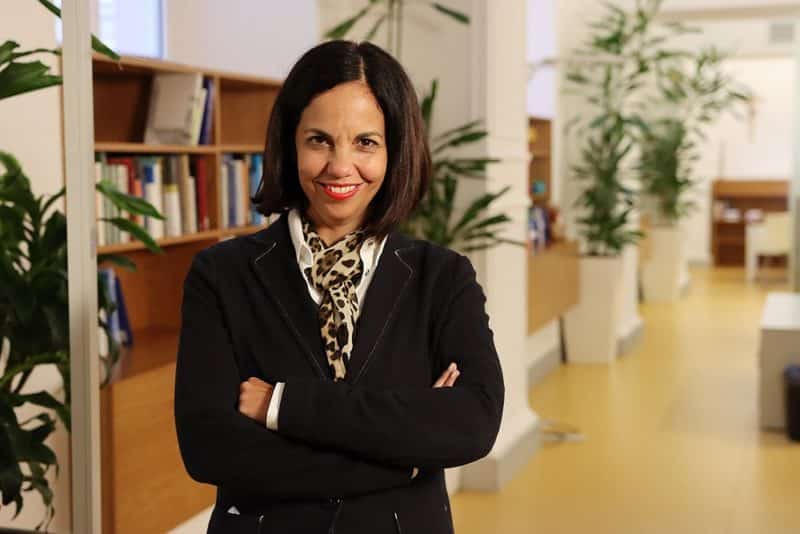The Eucharist “perpetuates until the end of time the incarnation” of God’s love for us and, in order to respond to the challenges of the times, we should renew ourselves in the mystery of the Eucharist.
Te Kupenga lecturer Dr Rocio Figueroa presented her reflection at the Auckland Eucharistic Convention held on July 16-18 at St Mary’s College in Ponsonby.
“Responding to new challenges belongs to the core of our faith and mission. To respond to new situations, the Church needs to renew itself,” she said.
To renew ourselves through the Eucharist, she said we need to “go back to the Gospel and return our gaze to Jesus to comprehend and remember what the sense of the Eucharist is”.
Dr Figueroa said meals played a “fascinating role” in Jesus’ ministry. As opposed to the very exclusive Jewish meals at the time, Jesus’ table is open to everyone: Pharisees, tax collectors, sinners, the poor, as well as the blind and lame, she said.
“Luke portrays ten meals and shows how the core of Jesus’ message is the Kingdom of God. The meals are an anticipation of this Kingdom, and Jesus wants to reveal the values of this new Kingdom,” she said.
“Jesus identified himself with the Kingdom: with his arrival the salvation has come. A Kingdom of peace, joy and forgiveness. A Kingdom in which all are called children of God and God is a merciful Father.”
She said that Jesus, during these meals, “urged a practice of mercy and compassion, open-handed and open-hearted generosity”.
“Jesus trusts in his merciful Father, whose Kingdom is opened to all,” she said.
Dr Figueroa stressed that the Kingdom that Jesus established is not a physical place, but a heart that “is embracing the suffering of the world, consoling the ill, visiting the widows, protecting children, defending the oppressed and denouncing everything that, in this world, goes against God’s Word”.
“It is a Kingdom of ‘inclusivity, generosity, acceptance of the lost and lowly, forgiveness, status
reversal, humility and service’,” she said, quoting Dr John H. Elliot’s paper, “Meals and Food in the Jesus Movement: Decoding Social Meanings”.
Dr Figueroa said that, when we think of the Eucharist, we should not think only of the Last Supper, but of all the other meals that Jesus offered.
She quoted distinguished lecturer at Fordham University in New York, Fr Eugene LaVerdiere, SSS, who said in his book “Dining in the Kingdom of God” that “Gospel that does not find expression in the Eucharist is greatly impoverished. Eucharist that is cut off from the Gospel is pastorally ineffective”.
Dr Figueroa said the Last Supper is the culmination of all the meals and the teachings that Jesus shared with people during his ministry.
“When he asks us: do this in memory of me, he is not only asking us to repeat the eucharistic ritual at Mass every Sunday, but above all he is asking us to remember that our lives must become Eucharist, that our lives must also be broken lives like the bread for the sake of others,” she said.
John
Reflecting on what John’s Gospel inidcates about the Eucharist, Dr Figueroa said the evangelist clearly illustrates this as a “sacrament of love”.
John 13:1 described the hour of Jesus. “Now before the festival of the Passover, Jesus knew that his hour had come to depart from this world and go to the Father. Having loved his own who were in the world, he loved them to the end”.
Dr Figueroa said this was “an intimate, close, trusting dialogue” between Jesus and the disciples.
For John, she said, the “hour of Jesus” means the manifestation of Jesus’ glory and infinite love for humankind.
“His incarnation was the manifestation of the Father’s love for humanity, and all of Jesus’ life was a life lived in a dynamic of self-giving and service for the people,” she said.
In the face of God’s love, we can only respond with love, Dr Figueroa said. “Our encounter with the Lord in the Eucharist is an encounter of love and friendship in the likeness of John. It should similarly follow the relationship between two friends,” she explained.
“We must know the Lord Jesus as a friend knows his friend. In friendship, there is an inner empathy, you know your friend not from
the outside, but you come to grasp and understand him by entering
into his heart, coming to a knowledge so deep that only friendship can give.”

Thank you for this beautiful reflection on Eucharist and the ‘table’ that Jesus kept open to all when he was on earth, snd which he surely keeps open to all now.
In this time of Lockdown it is challenge and gift to find ways to keep our ‘table’ open to all. God open our eyes to see and ears to hear, open our hearts to all snd show us ways yo be lovingly creative in gathering around your table. Maranatha, Come Lord.